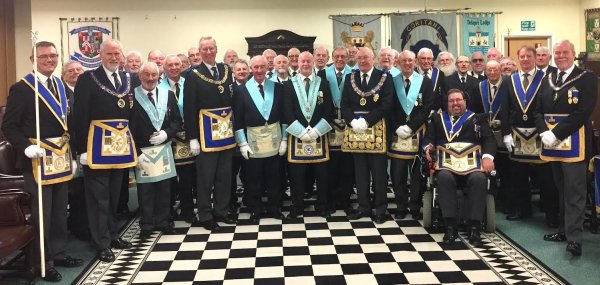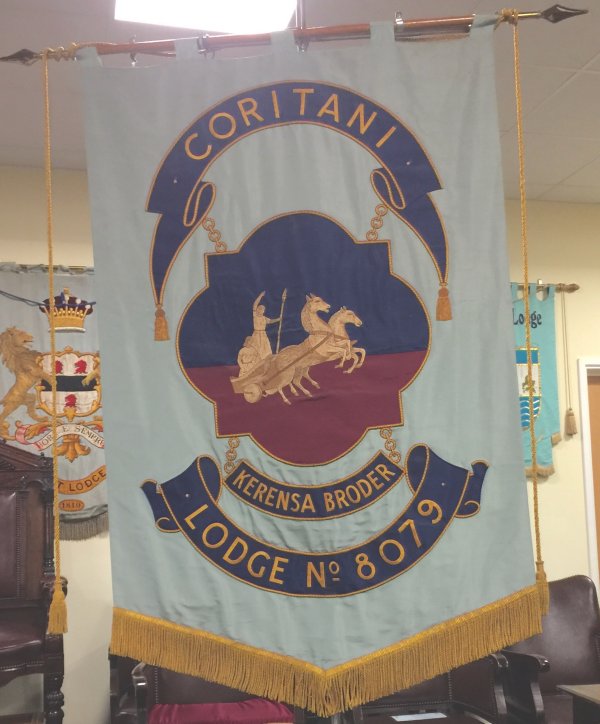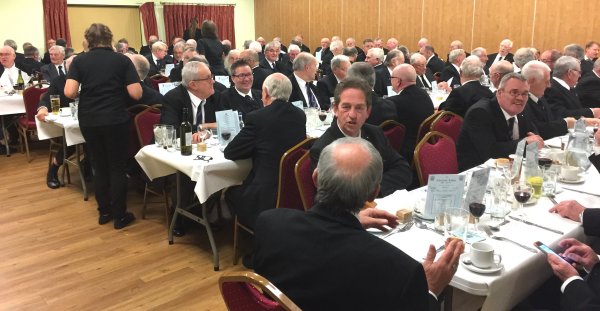On Tuesday November 22nd, most of the Provincial Team turned out at Sheaf Close to support our Provincial Grand Master conduct the ceremony of rededicating the banner of Coritani Lodge 8079 as part of their 50th anniversary celebrations. Over 110 brethren attended.

Coritani Lodge was consecrated on May 3rd 1966 and 6 years before they designed and sourced a banner that was formally dedicated at the Wheatsheaf Hotel Daventry, on October 26th 1972, by RWBro Richard Palmer the PGM at that time.

The Image on the banner portrays Boudicca in her chariot whilst the Motto, ‘KERENSA BRODER’ translates as ‘Brotherly Love’
Coritani’s mother lodge, Beneventa 2380 was named after the early Roman settlement of Bannaventa, situated at the North end of Borough Hill on the outskirts of Daventry, which ultimately became the present day village of Norton. In his dedication address, the Provincial Grand Chaplain, WBro Rev’d John Simmons, explained the design of Coritani’s banner which reflects the thought processes followed when the name ‘Coritani’ was chosen.

The Festive Board was well attended
Additional Historic Information
The ‘territory’ of the Celtic tribe of ICENI, one of the 35 British tribes known to have existed in the Iron Age period, stretched along the east coast from the town of Stour in Essex to the Humber in Yorkshire. The Iceni tribe was divided into two clans, the northern called ICENI CORITANI (Corieltauvi) and the southern ICENI CENOMANNI, divided more or less by the river NEN.
Of the former tribe, BANNAVENTA was the frontier city, covering it’s territories to the west, bordering on the DOBUNI of Oxfordshire and the CAENGI, foresters of Warwickshire.
Celtic people were deeply religious, worshipping many gods – the name Coritani actually meant ‘worshippers of the ‘effective’ deity’ – and to express their devotion to their gods, the Celts made regular offerings by placing items in rivers, deep pools and sacred groves and during times of great hardship they often deposited large numbers of precious objects, such as gold torcs (necklaces) and large earthenware vessels filled with coins, in deep pits in the ground. The Iceni had been minting coins from about 50 BCE, until the Roman conquest in 43 AD. These were usually silver coins with a patterned face on one side (obverse), with a horse on the reverse.
The ‘Celts’ were a warlike race of people who dominated Europe for 500 years. From 800 BCE Celtic civilization spread rapidly through mainland Europe, reaching the British Isles in around 500 BCE. By 400 BCE the Celts had become the most powerful people in Europe – an invading Celtic force of Senones led by Brennus very nearly succeeding in conquering Rome and after the Romans surrendered, the Celtic chieftains demanded a hefty ransom before agreeing to leave. Following this humiliating and embarrassing defeat, Rome’s hierarchy wanted revenge, realizing that the Celts now posed a constant threat to their civilization they immediately launched a military offensive, whose long term sole objective was to crush and subjugate the Celts.
In AD 43 the Roman emperor Claudius invaded Britain and while most of the British tribes in southern England, surrendered to the Romans without a fight, Caratacus, the Catuvellauni king, continued to fight and in 47 AD the Iceni rose in revolt after the Romans tried to enforce a law forbidding the carrying of weapons. The revolt was put down and Prasagustas established as a client king.
Prasutagas decided that it would be prudent to make his will assigning half of his personal property to the Roman emperor but when he died in 61 AD the Roman officials decided to interpret his will as a submission to the Roman state and moved to appropriate all of the Iceni lands and disarm the tribe.
Not surprisingly, Prasutagas's widow, Boudicca (or Boadicea as she was sometimes known) protested. The Romans had her publicly flogged and her two daughters were raped. In 61 AD Boudicca raised the Iceni and the neighbouring Trinivantes tribe in revolt against Roman rule and it was only with some difficulty that the Romans managed to quell the Iceni uprising, with Boudicca choosing to take her own life rather than fall into the hands of her enemies. The Romans established a new capital in the Iceni lands at Caistor, near Norwich and no record of the Iceni exists after this point, though legends suggest that large numbers fled west into Wales and eventually settled in Ireland.
